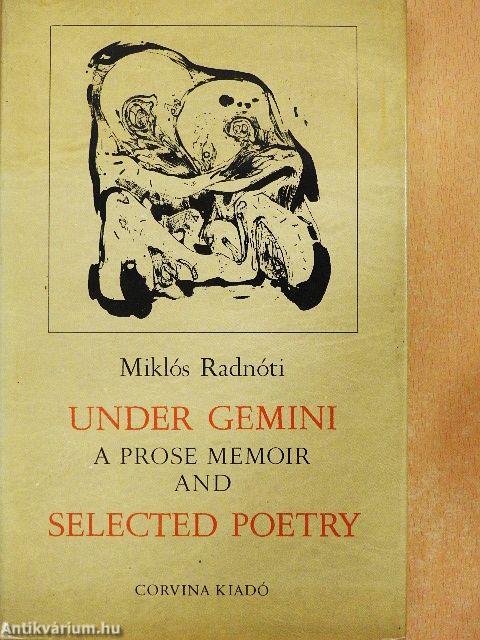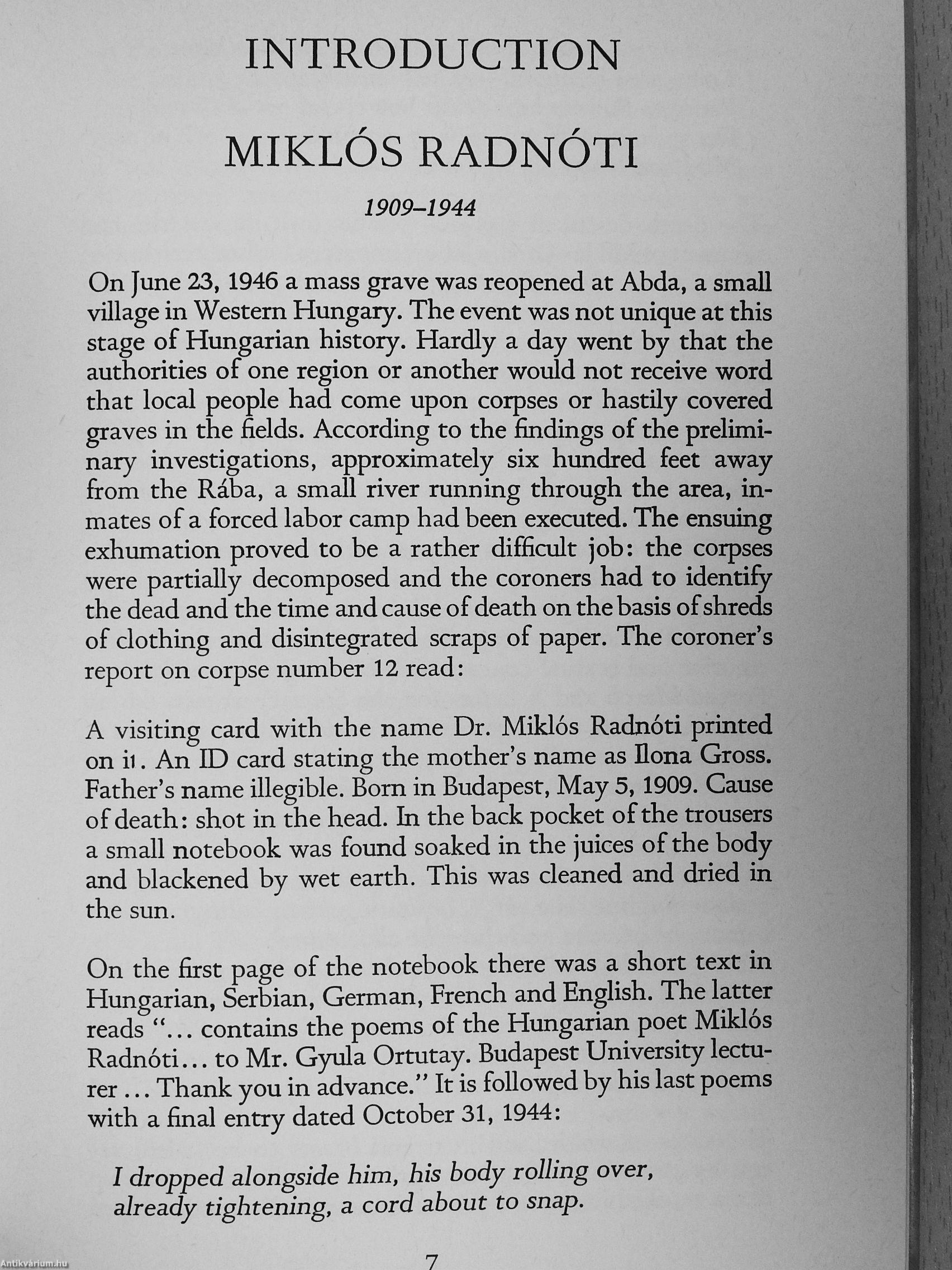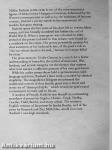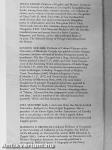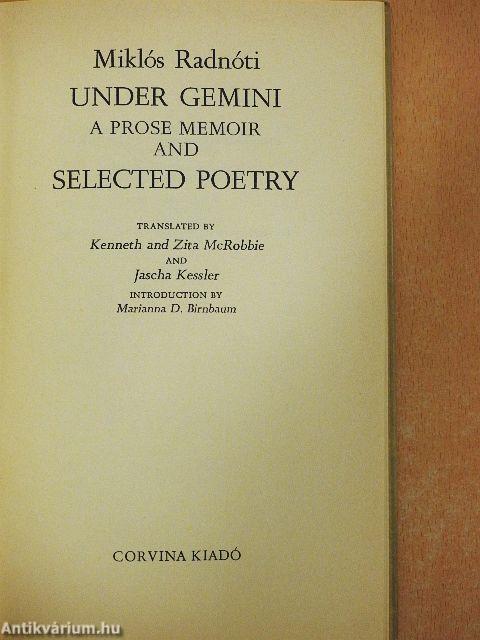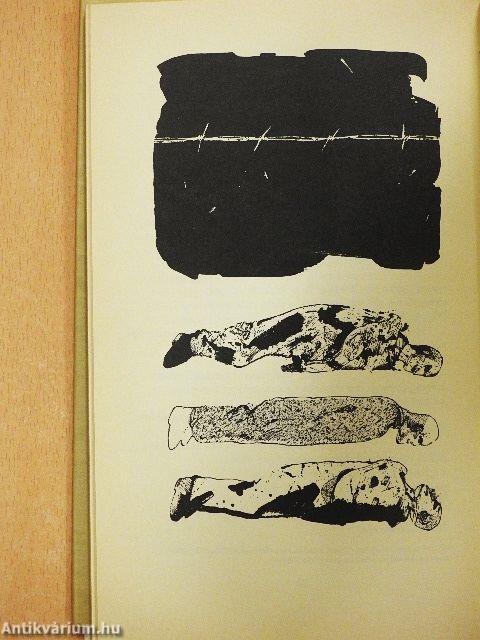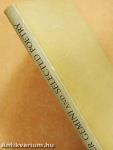1.104.112
kiadvánnyal nyújtjuk Magyarország legnagyobb antikvár könyv-kínálatát

VISSZA
A TETEJÉRE
JAVASLATOKÉszre-
vételek
Under Gemini
A Prose Memoir and Selected Poetry
| Kiadó: | Corvina Kiadó |
|---|---|
| Kiadás helye: | Budapest |
| Kiadás éve: | |
| Kötés típusa: | Fűzött kemény papírkötés |
| Oldalszám: | 107 oldal |
| Sorozatcím: | |
| Kötetszám: | |
| Nyelv: | Angol |
| Méret: | 23 cm x 14 cm |
| ISBN: | 963-13-0457-4 |
| Megjegyzés: | Fekete-fehér illusztrációkkal. |
naponta értesítjük a beérkező friss
kiadványokról
naponta értesítjük a beérkező friss
kiadványokról
Előszó
TovábbFülszöveg
Miklós Radnóti (1909-1944) is one of the most important figures of 20th-century Hungarian literature. Influenced by his Western contemporaries as well as by the traditions of his own country, Radnóti's poetry stands in the mainstream of modern European writing.
Radnóti spent the last years of his short life in various labor camps, and was brutally murdered just before the end of World War II. When a mass grave was exhumed in 1945, several of the poems included in this volume were found in a notebook on his corpse. His poetry powerfully projects his clear awareness of his ineluctable fate, of the poet's role as "the one whose death is decreed, / because he's never killed for them."
The prose memoir, Under Gemini, is a search for a better understanding of himself in the mirror of memories. War, freedom, and artistic integrity are the themes that support what is in essence a collective portrait of his own generation.
While his earlier poems show bold experimentation with language... Tovább
Fülszöveg
Miklós Radnóti (1909-1944) is one of the most important figures of 20th-century Hungarian literature. Influenced by his Western contemporaries as well as by the traditions of his own country, Radnóti's poetry stands in the mainstream of modern European writing.
Radnóti spent the last years of his short life in various labor camps, and was brutally murdered just before the end of World War II. When a mass grave was exhumed in 1945, several of the poems included in this volume were found in a notebook on his corpse. His poetry powerfully projects his clear awareness of his ineluctable fate, of the poet's role as "the one whose death is decreed, / because he's never killed for them."
The prose memoir, Under Gemini, is a search for a better understanding of himself in the mirror of memories. War, freedom, and artistic integrity are the themes that support what is in essence a collective portrait of his own generation.
While his earlier poems show bold experimentation with language and form, Radnóti's later work is marked by classical simplicity. The magnificent Eclogues transformed the traditional content of that bucolic genre into a bitter and ironic set of "destroyed idylls," which reveal the poet's total commitment to truth and to his art.
A student of French, Radnóti was himself an outstanding translator of poems by Sappho, Horace, Virgil, Shelley, Goethe, Trakl, Brecht, and many others. The sensitive English versions of his poems by Jascha Kessler, and of his prose by Kenneth and Zita McRobbie, would have met Radnóti's own high standards.
JASCHA KESSLER, Professor of English and Modern Literature i
at the University of California at Los Angeles, has published ten
books, among them three volumes of poetry, two volumes of
stories, and a volume of stories translated from the Hungarian
of Géza Csáth (d. 1919). Since 1963, he has translated the
work of more than two dozen contemporary Hungarian
poets, in collaboration with the Hungarian P.E.N. Club,
which made him the first American writer to be awarded the
Hungarian P.E.N. Club Memorial Medal in 1979. He has also
translated prose and poetry from the Serbo-Croatian,
Bulgarian, and Persian, and in 1982 published Bride of
Acacias. The Selected Poetry of Forugh Farrokhzad from
the Persian.
KENNETH McROBBIE, Professor of Cultural History at the University of Manitoba, Canada, has published three volumes of poetry, and two volumes of modern Hungarian poetry in translation: The Boy Changed into a Stag, selected poems of Ferenc Juhász (Oxford U. P., 1970), and with Tony Connor l ove of the Scorching Wind, selected poems of László Nagy (Oxford U. P., 1973). His translations are represented in the major anthologies, including: Penguin Book of Modern Verse Translation (1966), Modern Hungarian Poetry (Columbia U. P., 1977), and Ocean at the Window (University of Minnesota Press, 1979). His most recent translations of younger Hungarian poets have appeared in Modern Poetry in Translation (London), "New Kenyon Review," and "Partisan Review." He was a founding editor of "Mosaic. A journal for the comparative study of literature and ideas," and is a member of the editorial board of the quarterly "Slavic and East European Arts."
ZITA McROBBIE holds a doctorate from the Eötvös Loránd University, Budapest, in Finno-Ugric linguistics. She is president of the Finno-ügric Studies Association of Canada, and is con pleting a book on the Skolt Lappish dialect. Her other translations include modern Finnish short stories and Lappish poems.
MARIANNA D. BIRNBAUM is Adjunct Professor of Hungarian at the University of California at Los Angeles. She held an ACLS fellowship in Vienna (1970), and an IREX fellowship in Zagreb (1981). Author of books and essays on Renaissance and Modern Hungarian literature, she recently published a monograph, Miklós Radnóti: A Biography of His Poetry. Vissza
Témakörök
- Idegennyelv > Idegennyelvű könyvek > Angol > Szépirodalom > Regény, novella, elbeszélés
- Szépirodalom > Regény, novella, elbeszélés > Tartalom szerint > Családregények
- Szépirodalom > Regény, novella, elbeszélés > Tartalom szerint > Gyerektörténetek
- Szépirodalom > Versek, eposzok > A szerző származása szerint > Európa > Magyarország
- Szépirodalom > Regény, novella, elbeszélés > Az író származása szerint > Magyarország
- Idegennyelv > Idegennyelvű könyvek > Angol > Szépirodalom > Versek, eposzok > Egyéb
- Szépirodalom > Regény, novella, elbeszélés > Tartalom szerint > Életrajzi regények > Önéletrajzok, naplók, memoárok



